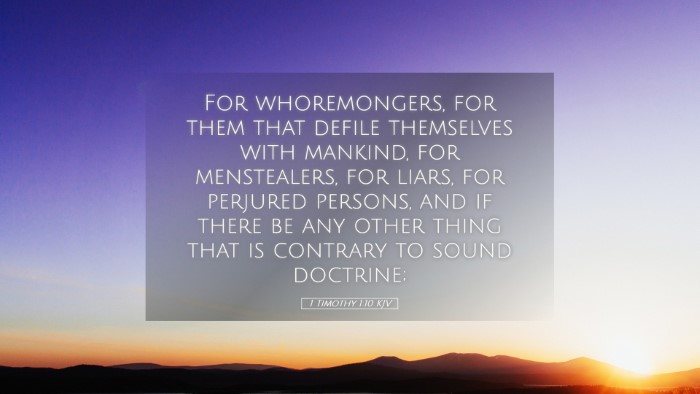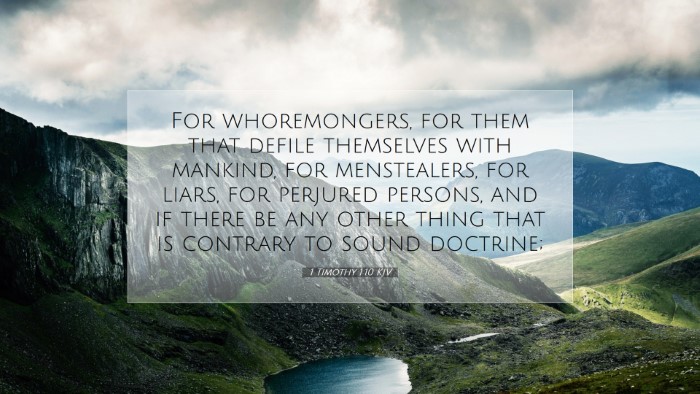Old Testament
Genesis Exodus Leviticus Numbers Deuteronomy Joshua Judges Ruth 1 Samuel 2 Samuel 1 Kings 2 Kings 1 Chronicles 2 Chronicles Ezra Nehemiah Esther Job Psalms Proverbs Ecclesiastes Song of Solomon Isaiah Jeremiah Lamentations Ezekiel Daniel Hosea Joel Amos Obadiah Jonah Micah Nahum Habakkuk Zephaniah Haggai Zechariah Malachi1 Timothy 1:10
1 Timothy 1:10 KJV
For whoremongers, for them that defile themselves with mankind, for menstealers, for liars, for perjured persons, and if there be any other thing that is contrary to sound doctrine;
1 Timothy 1:10 Bible Commentary
Commentary on 1 Timothy 1:10
Verse: "For whoremongers, for them that defile themselves with mankind, for menstealers, for liars, for perjured persons, and if there be any other thing that is contrary to sound doctrine;" (1 Timothy 1:10, KJV)
Introduction
The epistle of 1 Timothy is laden with important doctrinal and ethical considerations. In this verse, Paul outlines various sins and vices that are contrary to the Christian doctrine. This commentary seeks to synthesize the insights of public domain scholars such as Matthew Henry, Albert Barnes, and Adam Clarke, providing a comprehensive understanding of this pivotal scripture.
Contextual Analysis
In 1 Timothy, Paul writes to young Timothy, who is entrusted with the pastoral care of the church in Ephesus. The broader context of this letter addresses the importance of sound doctrine and the dangers of false teachings. This verse, positioned within a warning against various immoralities, underscores the need for the church to uphold moral integrity.
Understanding the Terms
- Whoremongers: This term refers to those who engage in sexual immorality, specifically promiscuity. Matthew Henry clarifies that it includes all sexual sins against the sanctity of marriage.
- Defile themselves with mankind: This phrase typically points to homosexual acts, illustrating Paul's condemnation of practices that deviate from God's intended design for human sexuality.
- Menstealers: Referring to those who engage in kidnapping or the abduction of people, particularly for slavery. This reflects a grave social issue that was prevalent in antiquity and is still relevant today.
- Liars: These individuals lack honesty and integrity, which Paul warns against as antithetical to the nature of Christ and His followers.
- Perjured persons: This refers to those who commit perjury or lie under oath, showcasing a severe violation of trust and justice.
- Contrary to sound doctrine: This culminating phrase serves to connect all the mentioned vices to the overarching commitment to apostolic teaching and ethical living.
Theological Implications
There is a strong emphasis on the moral and ethical standards expected of believers in this passage. Paul presents a catalogue of sins not just as a list of prohibitions but as a means to defend the integrity of the faith.
Paul's Ethical Framework
According to Adam Clarke, Paul’s outline illustrates how serious the implications of sin are on one’s spiritual life. It suggests that the Christian community must be vigilant in teaching and upholding scriptural standards to avoid moral decay. The vices listed serve not only as warnings but also as a call to engage in practical holiness.
Societal Corruption
Albert Barnes reflects on the societal context of these sins, emphasizing that the early Church faced pervasive immorality. Such behaviors were commonplace in the Greco-Roman world, yet Paul’s letter urges the church to rise above cultural norms, focusing instead on the transformative power of the Gospel.
Practical Applications for the Church
This passage has significant implications for modern readers, particularly pastors and church leaders. It serves as a reminder that the church must maintain a clear definition of morality based on scripture.
Call to Righteous Living
Believers are called to a life that reflects Christ’s righteousness. Matthew Henry emphasizes the importance of personal and corporate purity in the church, stating that the community’s witness to the world is at stake when moral standards are compromised.
Encouragement for Exhortation
For pastors, this verse emphasizes the necessity of preaching and teaching sound doctrine firmly yet lovingly. There is a delicate balance between holding to the truth of scripture while also extending grace to those who struggle with sin.
Conclusion
In 1 Timothy 1:10, Paul poignantly details the moral failings that oppose sound doctrine. This list serves both as a warning to the believers in Ephesus and as a timeless exhortation to the Church today. By comprehending the gravity of these issues, believers can strive toward holiness and uphold the integrity of the Gospel. The wisdom from Matthew Henry, Albert Barnes, and Adam Clarke provides a profound foundation for understanding the necessity of moral seriousness in the life of faith.


